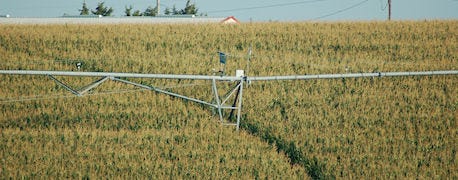July 3, 2013

Spoonfeeding nitrogen to corn through the season as the crop needs it is a tried-and-true practice. It's especially important on sandy soils.
One of the best methods of applying nitrogen now to the crop is through you center pivot irrigation system, a practice called either chemigation or fertigation.
University of Nebraska-Lincoln soils specialists and staff at the state's natural resources districts encourage producers to consider chemigation because of the following advantages and benefits:
•Provides the option to apply nitrogen to an already growing crop in the timeliest fashion.

Try The Advantages Of Applying Nitrogen Through Your Center Pivot
•Split applications involving chemigation reduces the potential for nitrogen leaching to the groundwater, thus improving water quality.
•Increases the crop's nitrogen use efficiency in most growing seasons.
•May reduce total nitrogen application, especially in growing seasons without excess spring rain.
However, anyone interested in using chemigation needs to obtain certification by taking chemigation training, according to the staff of the Central Platte NRD in Grand Island. Information about the training sessions can be found at water.unl.edu/web/cropswater/chemigation or by calling your local UNL Extension office.
Also, don't forget to get your chemigation permit if you plan to apply fertilizer or pesticides through your pivots. Nebraska law requires that anyone using chemigation have the proper safety equipment, a permit issues by the local natural resources districts, a certified applicator, and an equipment inspection by the NRD.
New permits for a chemigation system require a $30 fee and an inspection by the NRD before the system is started up.
A chemigation permit needs to be renewed every year for each system in order to keep the permit valid from one year to the next. The fee is $10 per pivot system and the system needs to be inspected on a three-year rotation.
If the safety equipment is not installed correctly, or is not in good working order, fertilizer or other chemicals can flow back into the well and contaminate the groundwater.
Penalties can be costly if a chemigation system is operating without a permit and/or safety equipment.
You May Also Like




